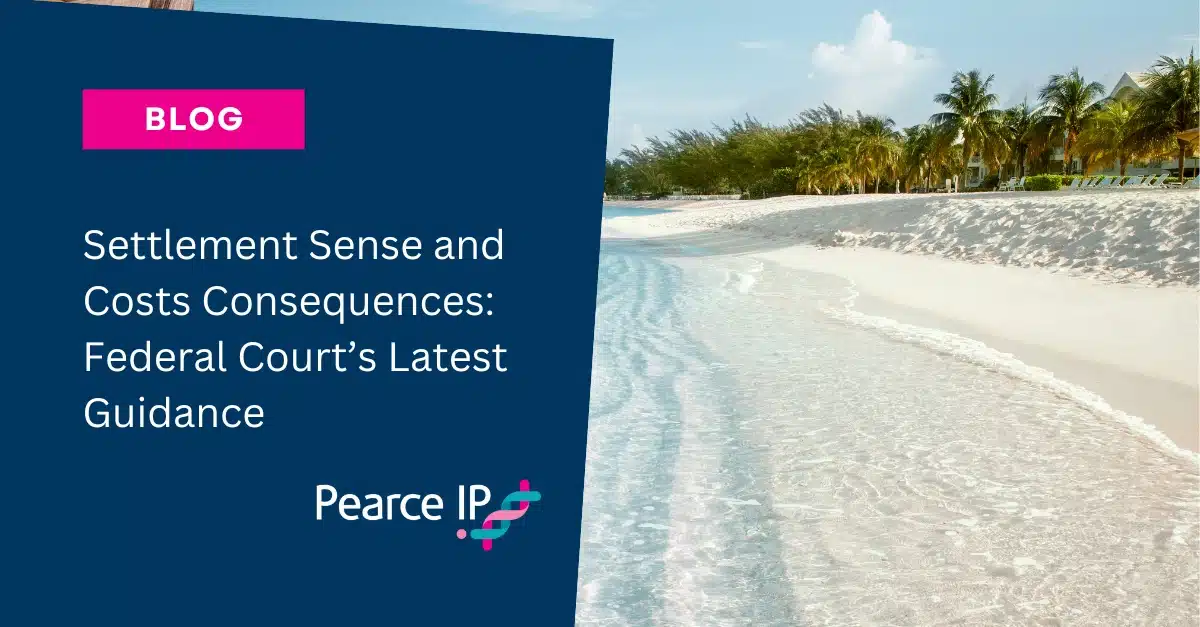Background
As patent proceedings involve substantial legal expenses, parties typically employ various mechanisms to optimise cost recovery, often by issuing Calderbank letters as well as formal Notices of Offer under the Federal Court Rules, which place the receiving party at risk of indemnity costs orders should the other party receive a more favourable judgment than the terms proposed in the offer.
The financial implications can be significant: while standard party/party costs orders typically result in recovery of approximately 60% of actual legal costs, an indemnity costs order can lead to recovery of up to 100%.
Here, we report on three recent decisions that demonstrate the Federal Court’s nuanced approach to costs orders and the consideration of settlement offers: Samsung Bioepis v Janssen, Stasiuk v Monster Energy Au, and Rakman International v Boss Fire & Safety.
Samsung Bioepis v Janssen
In January 2024, Samsung Bioepis AU Pty Ltd (Samsung) commenced proceedings against Janssen Biotech, Inc. (Janssen) seeking to revoke two certified innovation patents, AU2023100041 and AU2023100042 (the Old Patents), entitled ‘Safe and effective method of treating ulcerative colitis with anti-il12/il23 antibody’, citing certain prior art to allege a lack of novelty and innovative step.
In February, Janssen notified Samsung of new innovation patent application filings (AU2024100006, AU2024100007 and AU2024100016) (the New Patents) which excluded endpoints referred to in Samsung’s prior art citations. Samsung opposed Janssen’s intention to incorporate the New Patents into the existing proceedings prior to certification. Janssen subsequently agreed to proceed with a November 2024 trial date while reserving its rights in respect of the New Patents. After the New Patents were certified in August 2024, Janssen filed separate proceedings rather than amending the pleadings (as it had foreshadowed earlier in March). Justice Downes ordered the initial proceedings to be discontinued with Janssen to pay Samsung’s costs, prompting Samsung to seek indemnity costs, or alternatively on a special basis per James Hardie International Finance BV v CSR Limited [2007] FCA 366.
Consideration and Outcome
Justice Downes considered the following factors, ultimately rejecting Samsung’s application for indemnity costs or costs on a “James Hardie” special basis:
- Accrual of significant time and expense
Justice Downes noted that Samsung filed the proceedings without notice to Janssen and immediately sought to expedite them. Samsung pushed for a November 2024 trial date despite knowing about the New Patents and the possibility that Janssen would seek to amend to include the New Patents. Justice Downes concluded that this undermined Samsung’s complaint about accrued time and expenses.
- Surrender of Old Patents
Justice Downes rejected Samsung’s argument that Janssen’s lack of explanation as to the surrender of the Old Patents implied awareness of a weak case. Her Honour found that Janssen likely filed the New Patents as a safeguard against potential losses and to strengthen its position generally. Noting Janssen’s earlier intention to prosecute both the Old and New Patents, Justice Downes inferred that the decision to surrender was recent and thus declined to conclude that Janssen prolonged the pursuit of a hopeless or unmeritorious case.
- Disclosure of Intentions
Samsung complained that Janssen did not suggest that it would rely on the New Patents instead of the Old Patents. Justice Downes, however, found no evidence that Janssen always intended to abandon the Old Patents, considering it just as likely that Janssen waited for the New Patents’ certification before deciding to surrender the Old Patents.
- Impact on the Dispute
Justice Downes considered that if Janssen had not surrendered the Old Patents and agreed to the discontinuance orders, a trial would have proceeded in November 2024 where Samsung, if successful, would only receive costs on a standard basis. By surrendering the patents and consenting to discontinue the initial proceedings, her Honour observed that Janssen helped reduce costs and narrow the issues in dispute.
Stasiuk v Monster Energy Au
In April 2023, Joseph Stasiuk sued Monster Energy Au Pty Ltd (Monster) for infringement of his expired patent AU2006202191 (the ‘191 Patent) entitled ‘Laser-etched pull tab container opening devices and methods of making the same’.
Justice Nicholas ultimately dismissed Mr Stasiuk’s proceedings in March 2024 because he failed to fulfil a security for costs order, to file a Notice of Address for Service (Mr Stasiuk no longer had Australian legal representation and was based in the Cayman Islands) and to file evidence in chief on infringement. Monster sought its costs of the proceeding on an indemnity basis to be assessed in a lump sum.
In seeking indemnity costs, Monster relied on two settlement offers:
- A July 2023 Calderbank offer on a “walk away” basis where each party would bear their own costs. The offer explained that Mr Stasiuk’s likely unrecoverable costs would exceed the maximum possible damages (estimated at US$76,000 based on an existing third-party licence agreement for patents within the same family as the ‘191 Patent). Monster applied the royalty rate used in that licence, which it considered to be highly favourable to Mr Stasiuk, to the total number of Monster Cans sold in Australia during the relevant period, despite Monster maintaining that many of those cans did not incorporate the allegedly infringing feature. Stasiuk counteroffered for US$20 million, arguing that the existing licence was not comparable as it was negotiated during the patent’s “infancy”, and with a willing licensor as opposed to a “flagrant infringer”.
- A November 2023 Notice of Offer to Compromise (pursuant to r 25.01 of the Federal Court Rules) of US$220,000 plus costs (which included a 1.5x higher royalty rate and additional US$100,000 for supplementary damages), which Mr Stasiuk also rejected.
Consideration and Outcome
Justice Nicholas held that the July 2023 Calderbank ‘walk away’ offer was not a genuine compromise, observing that it was reasonable for Mr Stasiuk to reject an offer to discontinue proceedings with each party bearing its own costs, especially given the early stage of proceedings and unclear prospects at the time.
However, his Honour held that Mr Stasiuk unreasonably rejected the November 2023 offer considering its favourable terms (1.5x royalty rate plus additional damages and costs), appropriate consideration time (14 days) and clear expression. Further, since Mr Stasiuk had access to Monster’s Product and Process Description for two months and had attended mediation at the time of offer, Justice Nicholas inferred that Mr Stasiuk no longer believed the costs and uncertainty of pursuing the case to be justified. In accordance with r 25.14(2) of the Federal Court Rules, Justice Nicholas ordered Mr Stasiuk to pay Monster’s costs on a party/party basis before 1 December 2023, and indemnity costs thereafter.
Justice Nicholas also ordered that Mr Stasiuk pay Monster’s costs on a lump sum basis given his overseas residence in the Cayman Islands, failure to pay security for costs, and lack of legal representation after December 2023. Adopting the ‘broad brush’ approach taken by Jackson J in Frigger v Trenfield (No 12) [2022] FCA 900, his Honor calculated Monster’s costs at AUD$522,947.98, but notably excluded Monster’s request for potential costs for enforcing the order in the Cayman Islands as this exceeded the Court’s jurisdiction. Citing Coshott v Burke (No 2) [2018] FCAFC 81, Justice Nicholas applied a minor reduction to AUD$520,000 to account for possible overestimation. Having rejected Monster’s second offer, Justice Nicholas’ orders represented an AUD$850,000 turnaround for Mr Stasiuk (not including his own legal costs), highlighting the consequences of non-compliance with court orders and the risks involved in rejecting reasonable settlement offers.
Rakman International v Boss Fire & Safety
Rakman International Pty Limited (Rakman) and Trafalgar Group Pty Ltd (Trafalgar Group) (together, Trafalgar) sued Boss Fire & Safety Pty Ltd (Boss) and its sole director, Mark Prior, for infringement of patent AU2017101778 (the Patent). Boss counter-claimed seeking revocation as well as relief for unjustifiable threats and misleading conduct under the Australian Consumer Law. Justice Yates found all patent claims invalid, meaning Trafalgar’s infringement case failed (though his Honour noted if the patent was valid, Trafalgar would have succeeded against Boss, but not Mr Prior). While Boss’ unjustifiable threats claim failed, they succeeded in proving Trafalgar engaged in misleading conduct regarding a letter sent to building industry firms making statements concerning Boss’ conduct.
On costs, Trafalgar argued they should receive 90% of their infringement claim costs as it had succeeded on construction and infringement, subject to Justice Nicholas’ adverse findings on validity. Trafalgar further submitted that it should only pay 30% of Boss’ cross-claim costs, estimating a significant portion of Boss’ written submissions and evidence addressed grounds of revocation which were abandoned or else failed.
Boss sought indemnity costs based on Trafalgar’s rejection of a July 2019 settlement offer (the Offer) to discontinue proceedings if Trafalgar paid 80% of Boss’s costs. Justice Yates initially found Trafalgar’s rejection of the Offer to be unreasonable, thus engaging r 25.14(2) of the Federal Court Rules, and consequently ordered indemnity costs thereafter.
Trafalgar subsequently appealed, with the Full Court finding that an offer to merely discontinue proceedings would have left the Patent’s validity “at large” with no contractual barrier preventing Boss from bringing fresh revocation proceedings. The Full Court ordered costs of the proceeding (including the cross-claim) on a party/party basis, and remitted the matter back to Justice Yates to determine what discount, if any, should apply to Boss’ costs to account for matters that were abandoned or unsuccessful.
Submissions
Trafalgar proposed that Boss receive costs on a global basis with a 60% discount for matters that were abandoned or unsuccessful. Boss characterised this as a “deep discount” and argued that Trafalgar’s conduct in the proceedings was “wasteful”. Citing Burchett J in Australian Conservation Foundation v Forestry Commission of Tasmania (1988) 81 ALR 166, Boss further submitted that although it raised grounds which it abandoned at trial or else were rejected, they were not raised unreasonably and so should not be penalised. Finally, Boss submitted that its offer, and Trafalgar’s failure to accept it, remained relevant to the Court’s broad discretion in making an appropriate costs order.
Consideration and Outcome
Justice Yates emphasised Boss’ comprehensive victory, noting it had established invalidity, defeated the alleged infringement claim against Mr Prior personally, and succeeded in its misleading conduct claim against Trafalgar. Nevertheless, his Honour was satisfied that some discount should be applied. In reaching this conclusion, Justice Yates noted that:
1. Boss’ failed patent construction arguments were reasonable, supported by expert evidence, and formed a limited part of the case. Justice Yates further observed that given Boss’ failed unjustified threats claim shared a factual basis with their successful misleading conduct claim, a discount in respect of this failed claim was not warranted.
2. Boss succeeded in establishing invalidity based on disclosures made at the ‘Seltor meeting’ (which his Honour found to be novelty-destroying). While some invalidity grounds failed (utility and claim support), Justice Yates noted these were not Boss’ primary validity challenges and were partly determined by the construction issues. Nevertheless, his Honour held that this warranted some discount as the utility ground proceeded on a misunderstanding of the invention.
3. Some discount should be applied for grounds which Boss abandoned, including the abandoned ground of lack of sufficient description.
4. In relation to the claims that were abandoned by Boss as part of its lack of novelty case or else were decided against it, Trafalgar had mounted a “fantastical” and “fruitless” attack on Boss’ evidence which it was forced to defend and which unnecessarily complicated the case. His Honour also noted that, where Boss’ evidence did not independently prove lack of novelty, it was relevant to, and corroborative of, the evidence of what transpired at the ‘Seltor meeting’. Consequently, his Honour held that a discount was not warranted with regard to these aspects of its cross-claim.
Noting the impossibility of precisely calculating the appropriate discount, based on his Honours experience of the trial and analysis of the evidence, Justice Yates determined a 20% discount was fair – rejecting Trafalgar’s “extravagant” 60% reduction proposal as unjust. As a final observation, Justice Yates stated that Trafalgar’s rejection of the Offer was not relevant to his Honour’s determination.
Conclusion
These decisions illustrate that the strategic deployment and formulation of Notices of Offer and Calderbank letters can materially affect the ultimate costs position of parties in patent disputes. However, their effectiveness depends on factors such as the stage of proceedings, available evidence, and the overall conduct of the parties.
As seen in Samsung Bioepis v Janssen, the Court will not grant indemnity costs without exceptional circumstances justifying such an order. Similarly, in Rakman International v Boss Fire & Safety, the Full Court emphasised that an offer to merely discontinue proceedings, leaving fundamental issues unresolved, may not trigger the costs consequences under the Federal Court Rules. Finally, Stasiuk v Monster Energy Au highlights the importance of compliance with court orders and the risks involved in rejecting reasonable settlement offers.
About Pearce IP
Pearce IP is a boutique firm offering intellectual property specialist lawyers, patent attorneys and trade mark attorneys to the life sciences industries (in particular, pharmaceutical, biopharmaceutical, biotech, ag-tech and food tech). Pearce IP is the 2021 ‘Intellectual Property Team of the Year’ (Lawyers Weekly Australian Law Awards) and was shortlisted for the same award in 2022. Pearce IP is ranked in IAM Patent 1000 and Managing IP (MIP) IP Stars, in Australasian Lawyer 5 Star Awards as a ‘5 Star’ firm, and the Legal 500 APAC Guide for Intellectual Property.
Our leaders have been recognised in virtually every notable IP listing for their legal, patent and trade mark excellence including: IAM Patent 1000, IAM Strategy 300, MIP IP Stars, Doyles Guide, WIPR Leaders, 5 Star IP Lawyers, Best Lawyers, and Australasian Lawyer 5 Star Awards, and have been honoured with many awards including Australian Law Awards – IP Partner of the Year, Women in Law Awards – Partner of the Year, Women in Business Law Awards - Patent Lawyer of the Year (Asia Pacific), Most Influential Lawyers (Changemaker), among other awards.

Naomi Pearce
CEO, Executive Lawyer (AU, NZ), Patent Attorney (AU, NZ) & Trade Mark Attorney (AU)
Naomi is the founder of Pearce IP, and is one of Australia’s leading IP practitioners. Naomi is a market leading, strategic, commercially astute, patent lawyer, patent attorney and trade mark attorney, with over 25 years’ experience, and a background in molecular biology/biochemistry. Ranked in virtually every notable legal directory, highly regarded by peers and clients, with a background in molecular biology, Naomi is renown for her successful and elegant IP/legal strategies.
Among other awards, Naomi is ranked in Chambers, IAM Patent 1000, IAM Strategy 300, is a MIP “Patent Star”, and is recognised as a WIPR Leader for patents and trade marks. Naomi is the 2023 Lawyers Weekly “IP Partner of the Year”, the 2022 Lexology client choice award recipient for Life Sciences, the 2022 Asia Pacific Women in Business Law “Patent Lawyer of the Year” and the 2021 Lawyers Weekly Women in Law SME “Partner of the Year”. Naomi is the founder of Pearce IP, which commenced in 2017 and won 2021 “IP Team of the Year” at the Australian Law Awards.

Helen Macpherson
Executive, Lawyer (Head of Litigation –Australia)
Helen has over 25 years’ experience as an intellectual property specialist and is recognised as an industry leader. Helen advises on all forms of intellectual property including patents, plant breeder’s rights, trade marks, copyright and confidential information.
Throughout her career, Helen has maintained a strong focus on high-value patent mandates involving complex technologies. In these mandates, Helen has been able to draw upon her technical training in biochemistry and molecular biology, as well as her ability to up-skill swiftly in relation to diverse technologies. Helen’s patent work has encompassed the technical fields of inorganic, organic, physical and process chemistry, biochemistry, biotechnology (including genetics, molecular biology and virology) and physics.
Helen is a member of the Intellectual Property Committee of the Law Council of Australia, as well as a member of the Intellectual Property Society of Australia and New Zealand.

Nathan Kan
Lawyer
Nathan is a lawyer focused on providing legal services and advice to life sciences clients, with a focus on litigation support regarding intellectual property (patents, trade marks, designs, copyright, domain names, plant breeders rights and confidential information) and commercial disputes.
Nathan is passionate about the intersection of law and science. Whilst serving as Sponsorship Director and subsequently as Vice President of the Science and Technology Law Association (SATLA) at the University of Melbourne, he led various engagement events, workshops and publications covering a range of STEM fields, including life sciences, artificial intelligence and digital transformation.

